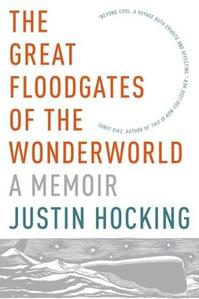
|
|
| photo: Anna Caitlin Harris | |
Justin Hocking is executive director of the Independent Publishing Resource Center in Portland, Ore., and co-founder of the IPRC's Certificate Program in Creative Writing and Independent Publishing. He has an MFA in creative writing from Colorado State University, where he also taught writing and literature. Before joining the IPRC staff, he worked in publishing in New York City. Hocking is the author of many zines and 13 books, including Life and Limb and Beach 90th. His writing has appeared in the Rumpus, Thrasher, Open City, the Portland Noiranthology, Concrete Wave, Travel Oregon and others. His memoir, The Great Floodgates of the Wonderworld, from Graywolf Press, is reviewed below.
Shelf Awareness runs a regular column called Book Brahmin, where we ask authors about their reading, and one question is: "Book you've faked reading." Moby-Dick is at the top of the list. Why did you want to write your book under such a huge white shadow?
Let me say first that I truly do not begrudge anyone who avoids reading Moby-Dick. It's a formidable book that carries some heavy cultural baggage. One of my goals with The Great Floodgates of the Wonderworld, though, was to illustrate how deeply relevant Moby-Dick is to our personal lives and to the current state of the world. At its heart, Moby-Dick is about surviving the dark ordeals we all encounter. It's about transformation. For these reasons I find it endlessly readable and meaningful. What I think trips most people up are Melville's digressions, his detailed taxonomy of whales and other weirdness that you won't find in a more conventional novel. I sometimes tell people to just skip those parts if they really need to. But mostly I encourage them to appreciate Moby-Dick's radical, polyphonic structure as an early form of improvisation and one of the most stunning, uninhibited outpourings of creativity in the history of literature.
As you make a "wonder-world" journey in your memoir, do you see yourself as a modern-day Ishmael?
I really wanted to avoid self-aggrandizement or self-mythologizing when writing this book, but I think it's safe to say that I strongly identified with Ishmael during my years on the East Coast. He begins his journey as a disgruntled urbanite with a deep longing for the sea. As an office worker in midtown Manhattan, I shared that particular longing, although mine manifested in a love for surfing at places like Rockaway Beach and Montauk.

Moby-Dick's multivalent, collage-like structure was definitely a major influence. It inspired me to expand well beyond my own personal narrative and include sections about my seafaring uncle, the history of surfing, and riffs on other artists and writers who were themselves influenced by Melville. I was also inspired by formal aspects of poetry and lyric essays, which often rely on a steady accrual of resonant images and themes, rather than a simple linear plot.
You write quite a bit about relationships with friends and girlfriends. Your books seems to derive some structural pattern and narrative flow from these. Do you agree?
Absolutely. One of my favorite aspects of Moby-Dick is the affectionate relationship between Ishmael and Queequeg. Something I always hope to impress on my writing students is that beneath the conventional, surface-level conflicts and rising tension, there is a deeper undercurrent of human connection that moves all narrative.
You write about surfing the "stirred up maw," the waves created by New York's Ophelia storm. What was that like? Were you crazy or just stoked?
The waves created in the wake of Hurricane Ophelia in 2005 were honestly some of the best I've ever surfed. I wasn't a very experienced surfer at that point, so my feelings alternated between fear and exhilaration. Depending on the conditions, I experience that same cocktail of emotions just about every time I set foot in the ocean--especially in Oregon, where surfing is a humbling experience.
What do you hope readers will take away from your memoir?
Several friends who read early drafts of the memoir were inspired to go back and read or re-read Moby-Dick. I have my fingers crossed that this will continue to happen. And I sincerely hope that readers will connect with Wonderworld on an emotional level. If my book can provide a little light for anyone on their own "night sea journey," that's all I can ask.
How happening is Portland as a reader/writer city--what with current resident authors like Ursula Le Guin, Cheryl Strayed, the new National Book Award poetry winner Mary Szybist, Chuck Palahniuk, Willy Vlautin, Chelsea Cain, Charles D'Ambrosio, etc., etc.?
It's true that Portland is brimming with great writers and dedicated readers. The best thing about the city's literary scene, in my opinion, is how welcoming and accessible it feels. I owe a big debt of gratitude to Portland, and especially to writers like Cheryl Strayed, who provided some necessary emotional encouragement while I finished this project.
Tell us about IPRC, where you currently work.
The Independent Publishing Resource Center is an amazing organization that combines elements of a DIY publishing company, a Book Arts center, a school, and an artists' collective. We have a huge new physical location in Portland, Ore., with nearly 4,000 square feet of public workspace, including a traditional letterpress studio, a screenprinting studio, a computer lab, photocopiers, two classrooms and one of the nation's largest zine and small press libraries. We also offer a yearlong Certificate Program that combines graduate-level creative writing workshops with hands-on publishing and printing intensives, with optional college credit available via the University of Oregon. To serve people outside of Portland, we're launching a low-residency version of the Certificate Program in late summer 2014; more information is available at iprc.org.
What's next? A novel, stories? A new study of Moby-Dick?
I'm working on a second memoir project. I'm also in the process of outlining a novel in which, similar to Wonderworld, the ocean plays a prominent role. --Tom Lavoie, former publisher

